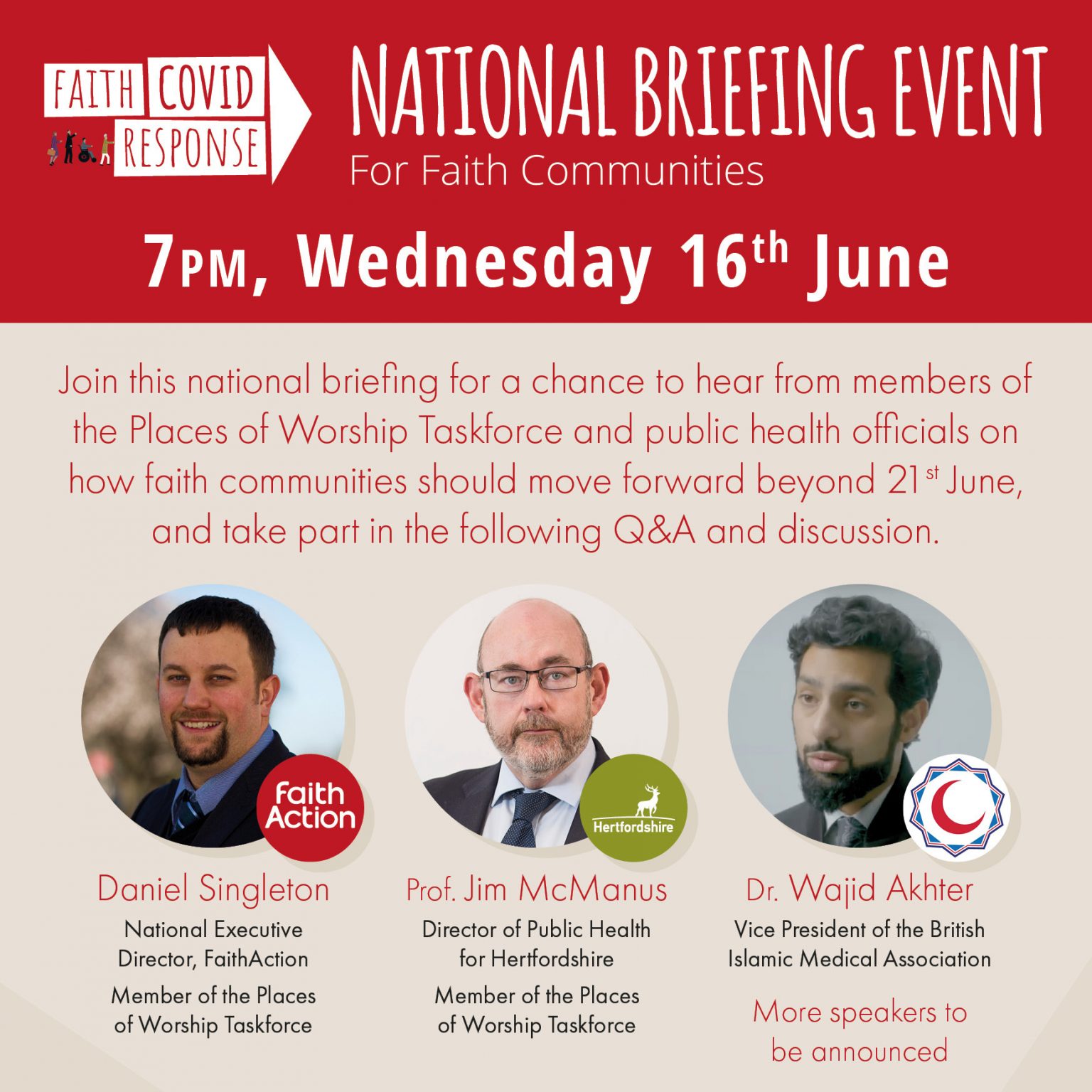One year on: findings from our Faith COVID focus groups

On this very day last year, 10 June 2020, we held our first virtual focus groups as part of our Faith COVID Response project. At that time, we were emerging from the first lockdown, with the new ‘rule-of-six’ permitted for outdoor meetings, and the first pupils returning to schools.
We completed six other single-faith focus groups that week, along with one women’s multifaith group, and though we slowed the frequency later, we kept these focus groups running consistently throughout the entire year.
As part of this work that we were doing for the Ministry for Housing, Communities and Local Government (MHCLG), we wanted to use these focus groups to reach people on the ground in all sorts of different places of worship, making sure we were getting the most accurate picture of the issues and concerns facing worshiping communities across the board, as well as best practice and bright ideas they might have.
Throughout the year, some issues were raised consistently – singing, mental health, funding, etc. – and others came up at particular moments as new, pressing needs. I’ve compiled a table below to give you a snapshot of just a few of the key ideas that came out of our focus groups each month.
June 2020 | |
1 June – ‘Rule of Six’ allowed outdoors, and first pupils return to school. 15 June – Places of worship allowed to open for individual prayer. | Most focus groups expressed that being allowed to open for individual prayer made little difference for them. All faiths expressed seeing an increase in numbers attending their services online (versus what they would expect at an in-person service) but were worried about those who have fallen off the radar. |
July 2020 | |
4 July – Hospitality businesses were permitted to reopen. Gatherings up to thirty people were legally permitted, although the Government was still recommending people avoid gatherings larger than six. At the same time, the first local lockdown was implemented in Leicester. | People were unsure why local lockdowns were happening and whether their city was going to impose one soon. This added to the uncertainty of many who weren’t sure when to begin reopening their places of worship. Towards end of month, many places of worship had opened up, but reported high attendance at first followed by a large drop as people were dissatisfied with the restrictions placed on their worship (lack of singing and childcare cited as reasons). |
August 2020 | |
Many were very unhappy in the North about the timing of last-minute local lockdowns and how they affected Eid. Restrictions on singing and chanting continued to be major sources of frustration, along with complaints about the relative freedom from restrictions in pubs and restaurants compared to places of worship. | |
September 2020 | |
14 September – PM warns second wave has arrived, and new ‘Rule of Six’ returns. | There was a lot of confusion among faith communities regarding the new 6-person limit and in which cases it applies to them or their buildings. There were many complaints about the 15-person limit on weddings and not being able to understand the rationale behind it. |
October 2020 | |
14 October – regional three-tier system introduced. 31 October – second national lockdown announced. | There was a general sense that many were starting to tire of the guidance and were becoming more eager to meet face-to-face. Faith hate: some Muslims were increasingly concerned about Islamophobia as they felt they were being blamed for the spread of the virus. Others expressed concerns about a potential second lockdown coinciding with many faith festivals and whether people would blame faith communities in general for the spread. |
November 2020 | |
5 November – second national lockdown begins. | Most participants disagreed with the government’s decision to close places of worship during the second lockdown. However, there was a wide spread of opinion rather than consensus. Concerns about mental health were raised in almost every focus group. Many felt that mental health concerns should have been weighed up with the decision to go into a second lockdown and that the closure of places of worship again would have serious repercussions for their communities on this front. Volunteer chaplains were still being denied access to many hospitals and care homes. |
December 2020 | |
2 December – lockdown ends and is replaced by a strengthened tier system. 8 December – first dose of vaccine administered. 19 December – PM cancels Christmas. 30 December – Most of country moved to tier four. | Many reported being better able to respond to local needs during the second lockdown. Some were frustrated that the allowances intended to be made for Christmas that weren’t allowed for festivals of other faiths. Concerns about funding were heightened again due to going back into lockdown. |
January 2021 | |
4 January 2021 – PM announces third national lockdown. | Christian, Jewish, Baha’i & Jain focus groups expressed some uncertainty about the vaccine, or had heard some scepticism in their communities. However, most saw the vaccine rollout as the main thing giving people hope that life may return to normal soon. Better relationships with faith communities would greatly increase the effectiveness of messaging. Concerns about mental health and loneliness were raised in almost every focus group, particularly regarding young people. |
February 2021 | |
22 February – lockdown roadmap announced. | The new normal is going to mean fundamental changes to the way that we interact with each other and the world, and faith needs to lead the way in how these changes are discussed and implemented to ensure they meet the growing needs of people for community and connection. Growing concerns over the mental health cost of continued isolation. Even those who were seen be the most resilient seemed to be affected by this point. |
March 2021 | |
8 March – all children return to school. 29 March – return of ‘Rule of Six’ outdoors. | Concerns about mental health were raised again, this time due to anxiety as we begin to reopen. Not all participants expressed a great deal of excitement about the easing of restrictions. People were more focused on how the vaccine roll-out is going. |
April 2021 | |
12 April – non-essential retail opens. Weddings and wakes can have up to 15 people. | Most groups happy with the hybrid mode of worship that has developed during the pandemic and are looking ahead to how/if things will change once further easing of restrictions occurs. No major concerns expressed about the vaccine roll out. All believed that uptake in their communities had been high and that myths were steadily being dispelled. One participant said we need to take account of the global following many of the ethnic minority leaders are who have been approached to endorse the vaccine. Due to greater belief in conspiracy theories abroad, some of these leaders have received a great deal of vitriol. |
May 2021 | |
17 May – ‘Rule of Six’ indoors. Most significant life events can have up to 30. | Lots of people were still very unhappy about singing restrictions. A huge number of large weddings are booked in for post-21st June. Some places of worship are concerned about so much social mixing. Many faith communities are planning to run education and social activities for young people over the summer. Concerns about Indian variant were rapidly beginning to rise. |
June 2021 | |
Uncertainty is increasing around 21 June final transition. Many questions persist around the “Indian” or “Delta” variant, social distancing, large events, and travel, among other things. | |
One year on from that first focus group, we have all grown more accustomed to living under various restrictions and dealing with changes and uncertainty. However, as we approach 21st June, when, as things stand, remaining restrictions are set to be lifted, levels of uncertainty have spiked. Regardless of when and how ‘complete’ the next easing of restrictions will be, there are many questions about best practice and what is safe that will need to be addressed.
For that reason, at 7pm on Wednesday 16th June, we will be convening a national briefing event for faith communities, where members of the places of worship taskforce and public health officials will present some thoughts on how best to move forward through the final phase of the roadmap, followed by an opportunity for Q&A and discussion.
If restrictions are indeed lifted as planned—and the government does not release any further guidance for places of worship—then the onus will be on all of us to exercise wisdom. It is therefore crucial that we come together as faith communities to discuss a course of action moving forward. We hope you’ll join us.

About Matt Allen
Project Officer
Matt plays an important role in FaithAction’s efforts to advocate for faith communities and the value they add to society. He was central in coordinating our COVID-Response project and continues to gather and collate concerns and ideas from faith communities up and down the country. He also oversees FaithAction’s work as Secretariat to the APPG on Faith and Society and works to support the propagation and health of Faith Covenants nationwide.



